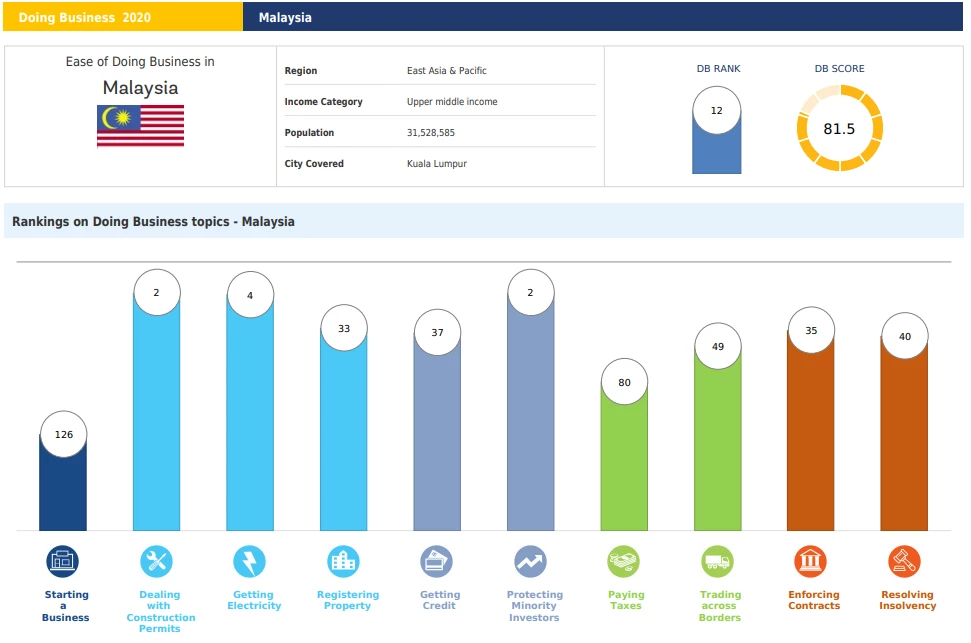 Malaysia retains its spot as global leader in the ease of Doing Business but as it moves forward, leveraging untapped potential is key to sustaining growth and competitiveness.
Malaysia retains its spot as global leader in the ease of Doing Business but as it moves forward, leveraging untapped potential is key to sustaining growth and competitiveness.
Slowly but surely, we are seeing more developing countries catching up in the ease of doing business. This is a signal for the world’s top performers that in order to remain competitive, they need to sustain the best possible pace of reforms and as of now, the potential for these economies remains largely unexploited.
What this means for Malaysia, a developing economy and a global leader in the World Bank’s Doing Business 2020 rankings, is that tapping into this potential could benefit the economy by further improving its business climate and fostering entrepreneurial activity, job creation and investments.
Malaysia has seen a steady improvement in its business climate for domestic small and medium-sized enterprises, moving up three places to a global rank of 12th out of 190 economies in the latest rankings. The consistent efforts to make regulations more efficient, accessible and simple have facilitated a conducive business environment for Malaysia’s local entrepreneurs. These demonstrate the government’s commitment to the expansion of business opportunities, innovation, job creation and reassurance for aspiring entrepreneurs and others in the private sector.

As a result of adopting international regulatory good practices, Malaysia’s significant achievements include:
- The second-best global performer on the dealing with construction permits indicator, taking local businesses only nine procedures to obtain all required permits and authorizations to build a warehouse. The overall time to complete this process is three times faster than the regional average. During the past year, Malaysia also streamlined the process to obtain construction permits by eliminating the requirement for a road and drainage inspection by the Kuala Lumpur City Hall.
- Globally, the second-best performer in the world in the protecting minority shareholders indicator. Malaysia’s legal framework has strong rules and requirements for the protection of minority shareholders.
- The fourth best global performer in the getting electricity indicator as the process for a business to obtain a permanent commercial electricity connection is now 23 times cheaper and substantially faster than the regional average.
Encouragingly, a total of 29 reforms have been implemented since 2003-2004, highlighting the country’ ongoing efforts to shorten the gap between its performance and international good practices. However, once a country reaches the cohort of top global performers, the scope for further improvement becomes more challenging as the gap between its performance and regulatory good practices grows smaller. But there is still space for potential reform. These include:
- Starting a business: Over the years, although the country has implemented seven reforms to make it easier to start and operate a business, it continues to be cumbersome for local entrepreneurs. Malaysia ranks 126th on this indicator, taking 8.5 procedures and 17.5 days.
- Paying taxes: Malaysia ranks 80th on this indicator. Domestic companies spend an average of 174 hours annually to comply with fiscal obligations, slightly more than the OECD high-income average of 159 hours.
- Legal rights and enforcing contracts: In the last five years, there have been no reforms in these areas for Malaysia. As such, improving on these indicators is crucial as it can enhance regulations that protect the rights of lenders and borrowers, and improve the efficiency of the judicial system. For instance, over the last five years, the time needed to enforce a contract in Malaysia has taken 425 days, whereas the required time in some countries in the region have reduced: from 440 to 420 days in Thailand, and from 471 days to 403 days in Indonesia.
In its pursuit of becoming a high-income and developed economy, Malaysia stands on strong fundamentals in terms of its business environment and existing pace of reforms. Moving forward, sustaining competitiveness and continuously creating the conditions for its entrepreneurs to thrive would require that policymakers use the findings of this latest study to benchmark progress, stimulate policy debate and identify potential challenges, good practices and lessons learned. Continuing this overall reform momentum and reinforcing efforts to address the remaining challenges where local entrepreneurs still face difficulties is key to ensuring efficiency and supporting the freedom to do business. This is no easy task for any country but identifying these areas as untapped potential represents an opportunity for new reforms which can sustain Malaysia’s position as a global leader in Doing Business.
Malaysia’s performance in the Doing Business 2020 study can be accessed here.


Join the Conversation